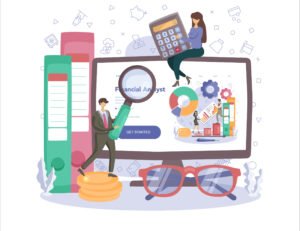Top 10 Accounting Skills Every Modern Accountant Must Upskill in 2025
Introduction
The accounting landscape in 2025 is evolving faster than ever. Traditional number-crunching roles are giving way to more strategic, tech-enabled functions. With businesses embracing automation, cloud computing, and AI, today’s accountants must master more than just debits and credits—they must be analysts, advisors, and tech-savvy professionals.
Staying relevant in this fast-changing environment requires more than basic knowledge—it demands continuous upskilling in key areas. Courses like a Diploma in Computer Application can provide a strong foundation in essential digital skills. Whether you’re just starting out or aiming for a leadership position, mastering these 10 essential accounting skills will future-proof your career and make you a valuable asset in any organization.

Why Accountants Must Upskill in 2025
As the profession transforms, these three drivers make upskilling a necessity to seize the best career opportunities:
1. Technology Integration in Accounting
AI, automation, and cloud-based platforms are revolutionizing accounting operations. Accountants are now expected to focus less on data entry and more on strategy, insights, and oversight of automated processes.
2. Regulatory and Compliance Evolution
New mandates such as ESG reporting and global standards like IFRS are reshaping the compliance landscape. Accountants must stay up to date with legal and ethical guidelines to ensure accuracy and transparency.
3. Demand for Real-Time, Data-Driven Decision Making
Executives increasingly rely on accountants to provide insights from real-time data. Strong analytical and reporting skills are now critical for influencing strategic decisions.

Top 10 Skills Every Modern Accountant Should Master
1. Data Literacy
Understanding and interpreting large volumes of financial data is a must. Accountants should be comfortable working with datasets to generate insights. Additionally, Understanding GST regulations and compliance is essential for accurate reporting and advising businesses effectively.
2. Excel Mastery
Advanced Excel skills—including pivot tables, VLOOKUP, and financial modeling—are foundational for financial analysis and reporting.
3. Data Visualization
Tools like Power BI and Tableau help accountants convert raw numbers into intuitive visuals, enabling better communication and faster decisions.
4. Tech Savviness
Familiarity with accounting software (e.g., Tally, QuickBooks, Zoho Books), ERP systems, and cloud accounting platforms is now expected.
5. Regulatory Knowledge
Understanding current standards like IFRS, GAAP, ESG disclosures, and taxation rules is essential to ensure compliance.
6. Analytical Thinking
Going beyond the numbers, accountants should be able to draw insights, identify trends, and recommend action plans based on financial data.
7. Client Advisory and Communication
Modern accountants must explain complex data clearly and deliver value-added advice to clients and internal stakeholders.
8. Risk Management and Controls
With increasing financial scrutiny, accountants must understand internal controls and how to manage financial and operational risk effectively.
9. Financial Planning and Forecasting
Skills in budgeting, forecasting, and strategic financial planning are critical for long-term business sustainability.
10. Adaptability and Continuous Learning
With technology and regulations evolving, successful accountants must continuously learn and adapt to stay competitive.
How to Build These Skills
Not every accountant needs to master all 10 at once. Here’s how to start:
- Evaluate Your Career Stage: Are you a student, fresher, or mid-career professional? Prioritize accordingly.
- Focus on Your Interests: Whether you lean towards tax, fintech, or audit, align your skills with your niche.
- Choose Quality Learning Sources: Look for industry-aligned, accredited courses—whether online, in-person, or hybrid.
- Be Consistent: Learning is a continuous journey. Even small improvements lead to big career advantages.
Conclusion
The role of accountants in 2025 extends far beyond ledgers and balance sheets. By mastering these 10 modern accounting skills—and complementing them with practical training like a Tally computer course to build a career—you’ll not only stay relevant, you’ll lead the way in an increasingly digital, data-driven world.
Ready to sharpen your skills?
Explore Sharada Academy’s hands-on programs designed to build real-world accounting expertise. From Excel and Tally to GST, analytics, and advisory training, we’ll help you stay ahead.
Download our free “Accounting Skills Checklist” or get in touch for personalized career guidance.
FAQs
Q: Which skill should I learn first as a beginner?
Start with Excel and basic data literacy—they form the foundation for all other accounting skills.
Q: Can I develop these skills without a commerce background?
Yes! Many skills like Excel, analytics, and cloud accounting tools are open to learners from all fields.
Q: Are these skills in demand internationally?
Absolutely. These skills are valued worldwide and often included in certifications like CMA, ACCA, and CPA.
Q: Do I need formal certification for these skills?
Not necessarily, but recognized certifications add credibility and are often preferred by employers.
Q: How can Sharada Academy help me acquire these skills?
We offer practical, industry-relevant training in accounting software, compliance, and analytics. Book a free consultation with us today!






